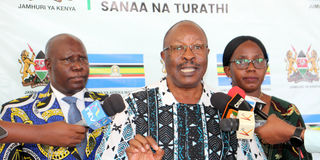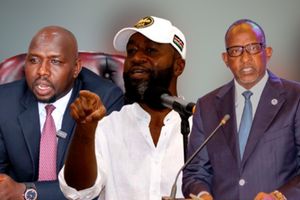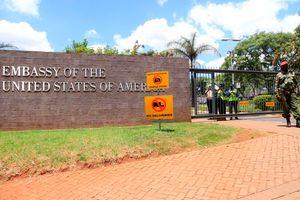NMG, partners to spearhead celebrations for Kiswahili language

East African Court of Justice President Justice Nestor Kayobera, Twaweza Communications CEO Kimani Njogu and East African Community Executive Secretary Dr Caroline Asiimwe addressing the press at Sarova Whitesands.
Nation Media Group has been selected as one of the key partners to spearhead the third East African Community (EAC) World Kiswahili Day celebrations in Mombasa, which kicked off on Friday.
Organised by the EAC and the Republic of Kenya, this three-day event will feature a series of activities under the theme "Kiswahili, Multilingual Education and the Enhancement of Peace".
World Kiswahili Language Day is marked on July 7. It was adopted by the member states of the United Nations General Assembly following a historic resolution tabled by Kenya and Tanzania on behalf of the African Group.
Nation Media Group intends to provide a platform for Kiswahili stakeholders to share knowledge, research, best practices, experiences and worldviews on the role of Kiswahili education in promoting a culture of peace.
"We are excited to spearhead this event and bring together diverse voices to discuss the impact of Kiswahili on peace and education," said a statement from Nation Media Group.
Originating in East Africa, Kiswahili is spoken in more than 14 countries, including Tanzania, Kenya, Uganda, Rwanda, Burundi, the Democratic Republic of Congo (DRC), South Sudan, Somalia, Mozambique, Malawi, Zambia, Comoros, and even in Oman and Yemen in the Middle East.
Southern African countries such as South Africa and Botswana have included it in school curricula, while Namibia and others are considering similar initiatives.
During the first day on Friday, stakeholders in the Kiswahili language community called for substantial financial investment in Kiswahili publications to promote peace and development within and beyond East Africa.
Lack of sufficient funding
Professor Kimani Njogu, CEO of Twaweza Communications, highlighted the lack of sufficient funding for Kiswahili publications, despite the rich knowledge of communities in building traditional institutions to resolve conflicts.
“We must go beyond academic boundaries by engaging communities to improve the construction of industries and agriculture through strengthening the Kiswahili language, as economic stability cannot be achieved without peace,” said Prof Njogu.
The contribution of the digital newspaper Taifa Leo in spreading peace in Kenya through articles, opinions and quotes from peace advocates was also highlighted.
Speaking during the second international conference of the East African Swahili Commission at Sarova Whitesands in Mombasa, stakeholders emphasised the need to promote Kiswahili in peacebuilding in East African Community member states.
Suggestions were made to reform the education system and curricula to inculcate ideas of respect and peace in young children.
Education system
“We must sow seeds early within the education system by changing the curriculum to foster positive peace rather than tribalism,” he added.
Gender, Culture and Heritage Cabinet Secretary Aisha Jumwa said the country's laws and policies should also be written in Kiswahili for better understanding.
“This will enable people to understand since Kiswahili is spoken by over 200 million people worldwide, so we must take pride in it,” she said.
The Speaker of the East African Legislative Assembly, Joseph Ntakirutimana, had earlier noted that the biggest challenge was the lack of a unifying language to promote reconciliation among foreign nations.
“Currently, in the EALA, we have members from seven countries, and the major challenge we face now is English. Hence, we need a single language to unify us,” he said.
During the three-day event, participants will discuss how Kiswahili and multilingual education can be used to educate society to promote peace at local, national, regional and global levels.
Peace education
The meeting will also explore policy implications for the use of Kiswahili and multilingualism in peace education, and make recommendations for promoting a culture of peace through language education.
The celebrations will include various activities such as youth mentoring programmes, media engagement, awareness-raising activities and outreach initiatives such as tree planting and cultural events.
One of the major highlights will be 'Usiku wa Mswahili', culminating in the grand celebration of World Kiswahili Day on Sunday.
Preparations are underway for the Sunday event at Fort Jesus, which is expected to bring together a wide range of stakeholders, including researchers, academics, practitioners, students, policymakers, language councils, language associations, the media and other Kiswahili stakeholders from the EAC and beyond.
Kenya's hosting of the World Kiswahili Day celebrations for the first time marks a significant milestone in the promotion of the language and its role in fostering peace and unity in the region.





